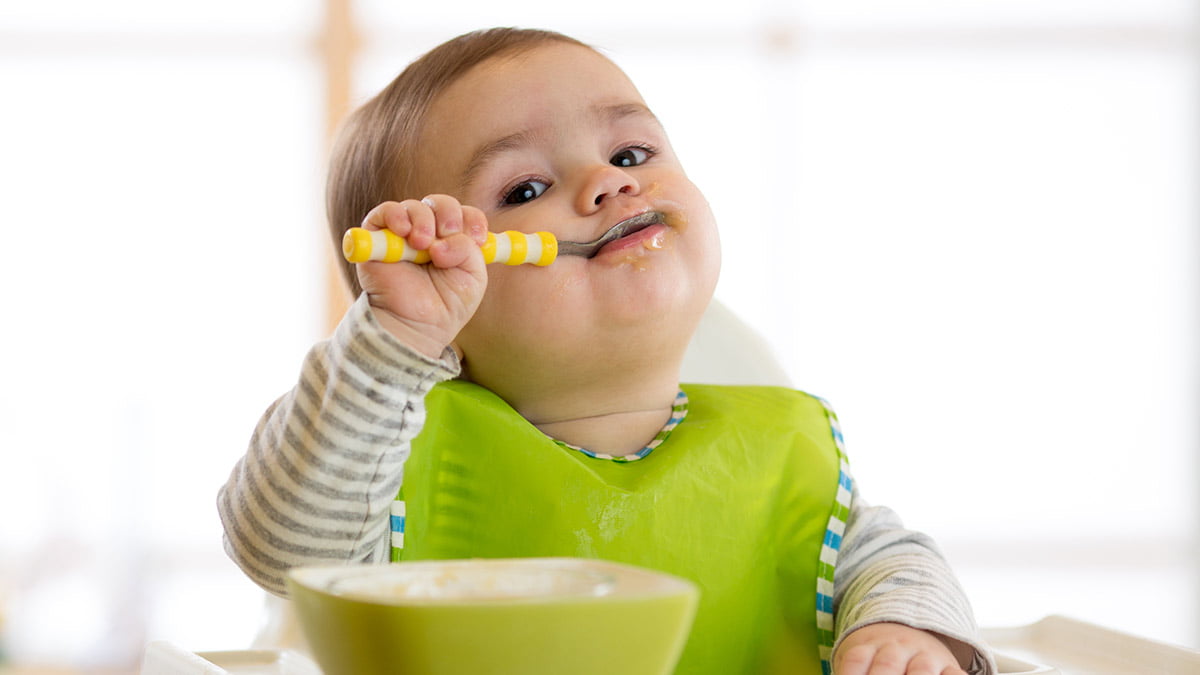


 11:32:27
11:32:27  2025-11-01
2025-11-01  1111
1111

Introduce solids at about six months of age
Breast milk is an important food for babies until at least 12 months of age, or longer if the mum and baby desire. Infant formula is important until 12 months. By about six months of age, a baby’s iron stores are low and extra foods will be needed to maintain healthy growth and prevent nutritional problems such as iron deficiency. Start to introduce solids around six months of age – when your baby starts showing interest in food.
Clues that your baby is ready for solids
When your baby starts to need the nutrients that solid food can provide, there will be obvious signs they are ready to try solid foods. These include:
Physical readiness for solids
Your baby’s organs and body grow and develop certain physical traits between four and six months. This indicates that their body is ready physically for solids. This maturing process includes:
Starting solids too early can cause problems
Hungry babies should be offered more breast or formula feeds until they are ready for solids. Some parents want to try solids early, believing this may help baby grow, sleep or settle better. Giving solids too early rarely helps these problems and may lead to other difficulties including:
Don’t leave starting solids too late
It’s also important that starting solids is not left too late, as this may lead to problems including:
Signs that your baby is not interested
Signs that your baby is not interested or is full may include closing the mouth tightly and turning the head away when offered food. They may cry when the food is offered or may push the spoon away. If this happens at your first attempts to feed your baby, relax and try again in a few days. While most babies naturally spit food out when first given solids, they soon learn to accept foods if you continue.
Getting to know when your baby is hungry or full is important to having happy, relaxed and enjoyable mealtimes.
Tips for introducing solids
Suggested first foods
First foods can be prepared easily and cheaply at home without salt, seasonings and sweeteners. The foods should at first be mashed and smooth, but you can quickly move on to coarsely mashed foods and coarser textures. General suggestions include:
Later feeding skills – from 8 to 9 months
While a baby’s first solids should be mashed and smooth, they soon need variety in the texture as well as the type of food. Other suggestions include:
By the end of 12 months, your baby should be ready to eat a wide variety of family food.
Stay with your baby when they are eating. Let them sit with the family to watch and learn.
At around nine months your baby will develop other feeding skills. These include:
Always avoid small hard foods, such as nuts and hard uncooked vegetables, because babies might choke. Fruit juice is not suitable for babies.
Suggestions include:
Allergy and vegetarianism
There are issues to consider when you introduce solids to your baby, especially if your baby has shown signs of allergies or your family eats a vegetarian diet.
Unsuitable foods
Some foods are not suitable for babies under 12 months. These include:
Reality Of Islam |
|

MXenes are

A newly dev

Get ready f

Researchers
 9:3:43
9:3:43
 2018-11-05
2018-11-05
10 benefits of Marriage in Islam
 7:5:22
7:5:22
 2019-04-08
2019-04-08
benefits of reciting surat yunus, hud &
 9:45:7
9:45:7
 2018-12-24
2018-12-24
advantages & disadvantages of divorce
 11:35:12
11:35:12
 2018-06-10
2018-06-10
 6:0:51
6:0:51
 2018-10-16
2018-10-16
 8:15:37
8:15:37
 2023-02-16
2023-02-16
 10:35:40
10:35:40
 2022-05-26
2022-05-26
 2:5:14
2:5:14
 2023-01-28
2023-01-28
 7:26:19
7:26:19
 2022-04-08
2022-04-08
 4:26:43
4:26:43
 2022-02-21
2022-02-21
 8:21:9
8:21:9
 2018-06-21
2018-06-21
 6:14:3
6:14:3
 2023-01-18
2023-01-18
 5:41:46
5:41:46
 2023-03-18
2023-03-18
| LATEST |